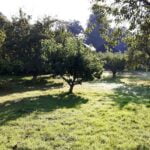Radio Lento
Not specifically for children, but each episode features a lovely landscape sound postcards in 3D immersive sound. Best with earphones. Listen while reading, resting or being mindful.
Not specifically for children, but each episode features a lovely landscape sound postcards in 3D immersive sound. Best with earphones. Listen while reading, resting or being mindful.
 Episode One: Episode 1 – Suffolk wood at 6am
Episode One: Episode 1 – Suffolk wood at 6amCreated by: Hugh Huddy
Started: March 29th, 2020
Status: Active, 296 episodes
Kind: Episodic
Language: English

<a href="https://soundcarrot.com/shows/shows/radio-lento/page/27/" title="SoundCarrot.com - Children's podcasts"><img src="https://soundcarrot.com/img/sc-sm.png" alt="Listen On SoundCarrot" style="width: 200px; height: auto" /></a>Above the mud silt beach, it’s all bright clouds, moving. Then the sun breaks through. The river is stretching wide here, left to right, silently carrying the land’s outflow through marshes, and out to sea. Warm wind blows in between long spells of calm. Close by, on the tree holding the microphones, and almost within touching distance, small waxy leaves rustle in the summer breeze.
They look as if they are swimming in it. The banks of trees. Tense into the current, swaying, twisting in sympathy with the changing wind. Like they’re wading out into on-coming waves, wading out to be washed in this force of sky, landing.
High tide on the River Crouch. Night. Not a soul about. Small bobbly waves gamboling along the brimming tideline. Playful, in swilling swirls, reaching for one more inch of land, before the ebb. From the east, a lazy wind muffles.
Last day of August. Pleasant sunshine, blue sky. Wind 1 to 2 knots, barely noticeable. Standing tall with motionless leaves, the trees are leaning into the warmth, letting their limbs soak up every available ounce of the sun’s golden heat. Along the old bridleway, away from the grey noise of a cross-country road, quiet fields are revealed. Knee deep with grass. Waiting to be mown.
Sunlit pontoons. Taut ropes. Empty footways. Still, like a photograph. So many boats moored up, waiting for someone to come down to sail them. This is the marina at Burnham-on-Crouch, Essex, where to the eye, on this hot summer day in August, everything looks still. To the ear though, it’s a different story.
From over the fields beyond the edge of the forest, the bell of St Mary’s strikes 4. Within this empty space between the trees, the golden sound rings pure and clear, though there’s no one around to hear it. Soon, the dawn will come.
High up on an exposed moor, between the Derbyshire towns of Glossop and Buxton, an old oak tree leans into the wind. Its sound is heard only by passing walkers, who from time to time, clink through the gate on their way over the exposed moor. As we passed, we tied the microphones to one of the low boughs, leeside of the strong prevailing wind, and left them alone to record.
Stop walking! There’s a place to sit. Roll up your jacket to make a cushion and perch on the rocks, just for a moment, to take in the view. Look! Over the expanse of cloud-dappled water, beyond, where the outgoing surge of the river Blackwater swirls into the North Sea, that’s Mersea Island. From here, just a sliver of low lying land.
Created by: Hugh Huddy
Started:
March 29th, 2020
Status: Active, 296 episodes
Kind: Episodic
Language: English
When Chloe is sent off to live with her mysterious and eccentric grandmother she learns an unbelievable secret. Grandma Ivy is none other than Mother Nature herself! And Chloe is next in line to assume to the power and responsibility of the job. Can a twelve-year old learn to balance the entire world’s ecosystem while just trying to fit in at her new school? Only Mother Nature knows.
Find your next favourite Podcast
Sound Carrot is your source for Family Podcast Discovery. Verified awesome, 0% boring.
Privacy Focused
Distraction free website, no flashing banners or adverts to steal your attention.
(Some shows do contain their own ads however).
Kid verified
At first I made this site for my kids, but like any dad I got a little over excited. I hope you find it as useful as they do.
Whether you want to listen to them together in the car, or alone in your room - the content is all safe for younger ears.
This is just so relaxing to listen to.